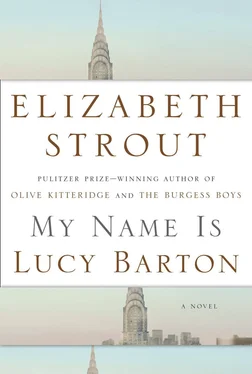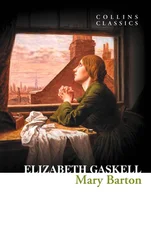“That’s just kids, Mom,” I said. “Kids always think places smell funny.”
My mother took her glasses off, breathed on each lens briskly and cleaned them with the cloth of her skirt. I thought how naked her face looked then; I could not stop staring at her naked-looking face. “And then one day, you know, the times changed. People think everyone went foolish in the sixties but it wasn’t until the seventies, really.” Her glasses returned — her face returned — my mother continued. “Or maybe it took that long for the changes to find their way to our cow patch. But one day Kathie came to visit, and she was giggly and strange — girlish, you know. You’d gone off by then. To—” My mother raised her arm and wiggled her fingers. She did not say “school.” She did not say “college.” And so I didn’t say those words either. My mother said, “Kathie fancied someone she’d met, that was clear to me, though she didn’t come out and say so. I had a vision — a visitation, it would be more accurate to say; it came to me as I sat there looking at her. And I saw this, and I thought: Uh-oh, Kathie’s in trouble.”
“And she was,” I said.
“And she was.”
Kathie Nicely had fallen in love with the teacher of one of her children — who were all three in high school by this time — and she began to see this man secretly. Then she told her husband that she had to realize herself more fully and she couldn’t do it trapped by domestic chains. So she moved out, left her husband, her daughters, her house. It wasn’t until she called my mother weeping that my mother learned the details. My mother drove to find her. Kathie had rented a small apartment, and she was sitting on a beanbag chair, much skinnier than she used to be, and she confessed to my mother that she had fallen in love, but once she’d moved out of her house the fellow had dropped her. Said he could not continue with what they’d been doing. My mother, having come to this point in the story, raised her eyebrows, as though the puzzlement of this was large but not unpleasant to her. “Anyway, her husband was furious and humiliated and would not take her back.”
Her husband never took her back. He went for over ten years without even speaking to her. When the oldest girl, Linda, got married straight out of high school, Kathie invited my parents to the wedding, because — my mother surmised — Kathie had no one at the wedding who would speak to her. “That girl got married so quickly,” my mother said, speaking rapidly now, “people thought she was pregnant, but no child arrived that I ever heard about, and she divorced him a year later, and went off to Beloit, I believe, looking for a rich husband and I think I heard she found one.” My mother said that at the wedding Kathie kept flitting around, desperately nervous. “It was a sad thing to see. Of course we didn’t know a soul, and it was obvious she’d just about hired us to be there. We sat in the chairs — I remember on one wall of the place, you know, it was The Club, that silly fancy place in Hanston, and they had all these Indian arrowheads under glass, why was that, I wondered, who would care about all those arrowheads — and Kathie would try and talk to some person and then come right back to us. Even Linda, gussied up in white — and Kathie had not asked me to make the gown, the girl went out and bought it — even this bride-girl hardly gave her mother the time of day. Kathie’s lived in a little house a few miles from her husband, ex-husband now, for almost fifteen years. All alone. The girls stayed loyal to their father. I’m surprised, when I think of it, that Kathie was even allowed at the wedding. Anyway, he never had anyone else.”
“He should have taken her back,” I said, tears in my eyes.
“I suppose his pride was hurt.” My mother shrugged.
“Well, he’s alone now, and she’s alone, and one day they’re going to die.”
“True,” my mother said.
I became distraught that day, over the fate of Kathie Nicely, while my mother sat at the foot of my bed. At least I remember it that way. I know that I told my mother — with a lump in my throat and my eyes stinging — that Kathie’s husband should have taken her back. I’m quite sure I said, “He’ll be sorry. I’m telling you, he will.”
And my mother said, “I suspect she’s the one who’s sorry.”
But maybe that wasn’t what my mother said.
Until I was eleven years old, we lived in a garage. The garage belonged to my great-uncle who lived in the house next door, and in the garage there was only a trickle of cold water from a makeshift sink. Insulation nailed against the wall held a stuffing like pink cotton candy, but it was fiberglass and could cut us, we were told. I was puzzled by that, and would stare at it often, such a pretty pink thing I could not touch; and I was puzzled to think it was called “glass”; odd to think now how much time it seemed to take up in my head, the puzzle of that pretty pink and dangerous fiberglass we lived right next to every minute. My sister and I slept on canvas cots that were bunk beds, metal poles holding one on top of the other. My parents slept beneath the one window, which looked out over the expanse of cornfields, and my brother had a cot in the far corner. At night I would listen to the humming noise of the little refrigerator; it would go on and off. Some nights moonlight came through the window, other nights it was very dark. In the winter it was cold enough that often I could not sleep, and sometimes my mother heated water on the burner and poured it into the red rubber hot water bottle and let me sleep with that.
When my great-uncle died, we moved into the house and we had hot water and a flush toilet, though in the winter the house was very cold. Always, I have hated being cold. There are elements that determine paths taken, and we can seldom find them or point to them accurately, but I have sometimes thought how I would stay late at school, where it was warm, just to be warm. The janitor, with a silent nod, and such a kind expression on his face, always let me into a classroom where the radiators were still hissing and so I did my homework there. Often I might hear the faint echo in the gym of the cheerleaders practicing, or the bouncing of a basketball, or perhaps in the music room the band would be practicing too, but I remained alone in the classroom, warm, and that was when I learned that work gets done if you simply do it. I could see the logic of my homework assignments in a way I could not if I did my work at home. And when my homework was finished, I read — until I finally had to leave.
—
Our elementary school was not big enough to have a library, but there were books in the classrooms that we could take home and read. In third grade I read a book that made me want to write a book. This book was about two girls and they had a nice mother, and they went to stay in a different town for the summer, and they were happy girls. In this new town there was a girl named Tilly — Tilly! — who was strange and unattractive because she was dirty and poor, and the girls were not nice to Tilly, but the nice mother made them be good to her. This is what I remember from the book: Tilly.
My teacher saw that I loved reading, and she gave me books, even grown-up books, and I read them. And then later in high school I still read books, when my homework was done, in the warm school. But the books brought me things. This is my point. They made me feel less alone. This is my point. And I thought: I will write and people will not feel so alone! (But it was my secret. Even when I met my husband I didn’t tell him right away. I couldn’t take myself seriously. Except that I did. I took myself — secretly, secretly — very seriously! I knew I was a writer. I didn’t know how hard it would be. But no one knows that; and that does not matter.)
Читать дальше












